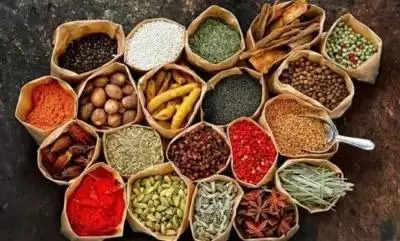9 Indian Spices To Help Lower Blood Pressure Naturally

Maintaining healthy blood pressure levels is crucial for overall well-being, as high blood pressure can lead to severe health complications such as heart disease, stroke, and kidney problems. While medication is often necessary, there are natural ways to help manage and lower blood pressure, including the use of traditional Indian spices. These spices, commonly found in Indian households, not only add flavour to dishes but also offer significant health benefits, including the ability to lower blood pressure. Here, we explore nine Indian spices that can play a vital role in managing hypertension.
1. Turmeric
Turmeric, often referred to as the 'golden spice,' is renowned for its potent anti-inflammatory properties. The active compound in turmeric, curcumin, has been shown to improve the function of the endothelium, the lining of blood vessels, which helps regulate blood pressure. Additionally, curcumin acts as an antioxidant, reducing oxidative stress—a factor that contributes to high blood pressure. Incorporating turmeric into your daily diet, whether in curries, teas, or smoothies, can help manage hypertension naturally.
2. Garlic
Garlic is another powerful spice known for its health benefits, particularly in lowering blood pressure. Garlic contains allicin, a compound that helps relax blood vessels and improves blood flow. Studies have shown that regular consumption of garlic can lead to a significant reduction in both systolic and diastolic blood pressure. Whether consumed raw, in powdered form, or as a supplement, garlic is a simple yet effective way to help manage hypertension.
3. Cinnamon
Cinnamon is a popular spice used in various dishes, from sweet desserts to savoury meals. Beyond its delightful flavour, cinnamon is also effective in lowering blood pressure. It helps dilate blood vessels, improving circulation and reducing strain on the heart. Regular intake of cinnamon, whether sprinkled on oatmeal or added to tea, can contribute to better blood pressure control, making it a valuable addition to your diet.
4. Cardamom
Cardamom, known for its aromatic flavour, is commonly used in Indian sweets and chai. This spice is rich in antioxidants and has diuretic properties, which help eliminate excess fluid from the body and reduce blood pressure. A study involving hypertensive individuals found that consuming cardamom daily for several weeks significantly lowered blood pressure. Adding cardamom to your diet, whether in curries, teas, or desserts, can be an effective natural remedy for hypertension.
5. Fenugreek
Fenugreek seeds are a staple in Indian cuisine and have been used for centuries for their medicinal properties. These seeds are high in fibre and have been shown to help lower blood pressure by reducing cholesterol levels and improving insulin sensitivity. Fenugreek can be consumed in various forms—whole seeds, powdered, or as a tea—to harness its blood pressure-lowering benefits.
6. Coriander
Coriander seeds and leaves are widely used in Indian cooking, offering both flavour and health benefits. Coriander is a natural diuretic, helping to remove excess sodium and water from the body, which can reduce blood pressure. Additionally, coriander has a calming effect on the digestive system, which can help reduce stress levels—a contributing factor to hypertension. Including coriander in your daily diet, whether as a spice or garnish, can support healthy blood pressure levels.
7. Black Pepper
Black pepper, often referred to as the 'king of spices,' is more than just a seasoning. It contains piperine, an active compound that has been shown to lower blood pressure by improving blood circulation and reducing inflammation. Piperine also enhances the absorption of curcumin from turmeric, making it a powerful combination for managing hypertension. Adding black pepper to your meals is an easy way to boost both flavour and health benefits.
8. Basil
Basil, or 'Tulsi’, as it is commonly known in India, is a revered herb with a wide range of health benefits, including the ability to lower blood pressure. Basil contains eugenol, a compound that helps relax blood vessels and reduce pressure on the heart. Additionally, basil has antioxidant properties that protect the heart and improve overall cardiovascular health. Fresh basil can be added to salads, teas, or cooked dishes to reap its hypertension-fighting benefits.
9. Ginger
Ginger is a versatile spice that adds warmth and depth to dishes, but its benefits go beyond flavour. Ginger has been shown to improve blood circulation and relax blood vessels, both of which contribute to lower blood pressure. Its anti-inflammatory properties also help reduce overall cardiovascular risk. Ginger can be consumed in various forms, such as fresh, powdered, or as a tea, to support healthy blood pressure levels.
Incorporating these nine Indian spices into your daily diet can be a natural and effective way to help manage and lower blood pressure. While these spices offer significant health benefits, it's essential to maintain a balanced diet and consult with a healthcare provider before making any significant changes to your health regimen. By embracing the natural power of these spices, you can enhance both your culinary experiences and your overall health, paving the way for a life of well-being and balance.
Next Story